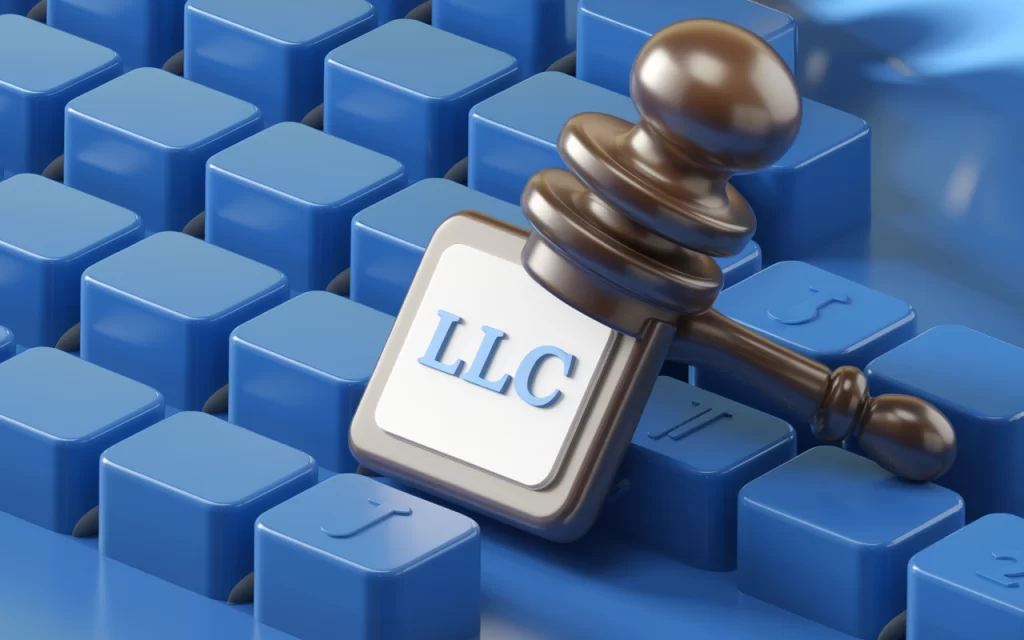Dissolve an LLC effectively by following the correct steps to ensure compliance with state laws and avoid future legal liabilities. Closing an LLC involves more than just ceasing operations; you need to file the appropriate paperwork, settle outstanding debts, and distribute any remaining assets. This comprehensive guide walks you through every step, ensuring a smooth […]

How to Dissolve an LLC: A Comprehensive Guide
Blueprint
Dissolve an LLC effectively by following the correct steps to ensure compliance with state laws and avoid future legal liabilities. Closing an LLC involves more than just ceasing operations; you need to file the appropriate paperwork, settle outstanding debts, and distribute any remaining assets.
This comprehensive guide walks you through every step, ensuring a smooth and orderly dissolution. Whether you’re closing due to business disagreements, financial reasons, or simply the completion of your venture, our step-by-step guide will help you dissolve an LLC with ease.
For additional help, using professional services like Northwest Registered Agent or ZenBusiness can simplify the process and ensure you comply with all legal requirements.
Step 1: Vote to Dissolve the LLC
The first and most crucial step to dissolve an LLC is to vote on the decision. This vote should involve all members of the LLC, following the procedures laid out in the LLC’s operating agreement. If your LLC does not have an operating agreement, refer to your state’s laws for the dissolution process. Most states require a majority vote among members to approve the dissolution.
Document the decision with an official resolution and record it in the LLC’s books. This documentation is crucial for legal and tax purposes, proving that the dissolution was agreed upon by the members.
Example Scenario:
Let’s say your LLC’s operating agreement stipulates that a 75% member vote is required for dissolution. If three of the four members vote to dissolve, the LLC will be formally dissolved, and the next steps in the process can commence. If no operating agreement exists, your state’s laws will apply.
For expert guidance on structuring the vote and recording decisions, we recommend working with Northwest Registered Agent, a trusted service that can help you through every step.
Step 2: File Final Tax Returns and Obtain Tax Clearance
Before dissolving your LLC, all final state and federal tax returns must be filed. Make sure to mark your tax returns as final, which informs the IRS and state tax authorities that your LLC will no longer be in operation. If you had employees, you must also file any remaining employment taxes. Failing to do so can result in personal liability for unpaid payroll taxes.
In many states, a tax clearance certificate is required before you can file dissolution papers. This certificate confirms that your LLC has no outstanding tax liabilities. Some states may even require you to provide a good-standing certificate from their tax department to prove that all taxes have been paid.
If you’re unsure about handling tax filings on your own, consider using an online service like ZenBusiness. Their experts will ensure all your tax obligations are met before dissolving the LLC.
Step 3: File Articles of Dissolution
Once taxes are taken care of, it’s time to submit Articles of Dissolution to your state’s Secretary of State or business registration office. This document officially informs the state that your LLC is winding down. Depending on your state, the form may also be called a Certificate of Dissolution or Certificate of Cancellation.
The form usually requires basic information about your LLC, such as the company name, dissolution date, and confirmation that all debts and obligations have been settled. Some states may also require you to indicate whether the LLC’s assets have been distributed among the members.
Filing fees vary by state, so be sure to include the correct payment. The state will then review your dissolution request and, once approved, issue a Certificate of Dissolution to confirm that your LLC is officially dissolved.
For an efficient, hands-off experience, consider using Swyft Fillings, which offers fast and reliable filing services to ensure all legal documents are properly submitted.
Step 4: Notify Creditors and Settle Outstanding Debts
Notifying your creditors is a crucial step to avoid future liabilities after dissolving your LLC. Creditors can include lenders, suppliers, service providers, and even landlords. In some states, you are legally required to notify your creditors before filing the Articles of Dissolution. Additionally, certain states require that dissolving LLCs publish a notice of dissolution in a local newspaper to formally alert creditors.
When you notify creditors, provide them with a deadline to submit any claims against your LLC. Typically, this deadline ranges from 90 to 180 days, depending on your state’s regulations. This step reduces the chances of unexpected claims arising after the LLC has dissolved.
Even if your state doesn’t require it, notifying creditors is a wise precaution. It helps you close out any remaining obligations and ensures that no financial liabilities surface in the future.
If managing creditor communications seems overwhelming, Bizee offers tools that streamline the process, helping you send notifications and organize creditor claims effectively.
Step 5: Distribute Remaining Assets
After settling all outstanding debts and obligations, the LLC’s remaining assets must be distributed among the members. Your operating agreement will outline how assets should be allocated. If your LLC does not have an operating agreement, state laws will determine how to divide the remaining assets.
Assets can include cash, investments, equipment, or real estate. These should be divided according to the ownership interests of the members unless otherwise agreed upon in the operating agreement.
For example, if your LLC has three members, and each owns a 33% share, the remaining assets will be divided equally among the members, unless the operating agreement specifies a different arrangement.
To simplify the asset distribution process, you can use platforms like Tailor Brands, which can help ensure a fair and legally sound allocation of assets.
Step 6: Complete Final Administrative Tasks and Close Business Accounts
Once all financial matters are settled, the final step in dissolving an LLC is to complete the remaining administrative tasks. These tasks include:
- Canceling business licenses and permits: Contact the relevant authorities to cancel any business licenses or permits issued to your LLC.
- Closing bank accounts: Shut down all business bank accounts and any lines of credit associated with the LLC.
- Canceling your Federal Employer Identification Number (FEIN): Notify the IRS that your LLC is closed and that the FEIN is no longer needed.
Additionally, if your LLC had employees, you will need to process the final payroll, file employment tax returns, and provide any severance pay if applicable.
Once these steps are completed, you can officially consider your LLC dissolved. Platforms like Registered Agents Inc can assist with the final administrative tasks to ensure everything is properly closed out.
Dissolving an LLC requires careful attention to detail and legal compliance. You can confidently dissolve your LLC without complications by following the steps outlined in this guide and using trusted online services like ZenBusiness, Swyft Fillings, and Tailor Brands.
Here is a comprehensive video elaborating on how this process can be conducted smoothly;
Frequently Asked Questions (FAQs)
Can I Use an Online Service to Dissolve My LLC?
Yes, online services such as ZenBusiness, Northwest Registered Agent, and Swyft Fillings can help you dissolve your LLC quickly and efficiently. These services take care of filing paperwork, notifying state authorities, and guiding you through the dissolution process.
How Long Does It Take to Dissolve an LLC?
The time required to dissolve an LLC depends on your state and the complexity of your business. On average, the process takes one to two weeks. However, the process could take longer if there are unresolved debts or legal matters. Services like Swyft Fillings can expedite the process if necessary.
Do I Need a Lawyer to Dissolve My LLC?
While hiring a lawyer is not mandatory, it can be helpful in complex cases. For simpler LLCs, online services like ZenBusiness or Northwest Registered Agent can handle all the paperwork and filings, saving you time and ensuring that the process is done correctly.



